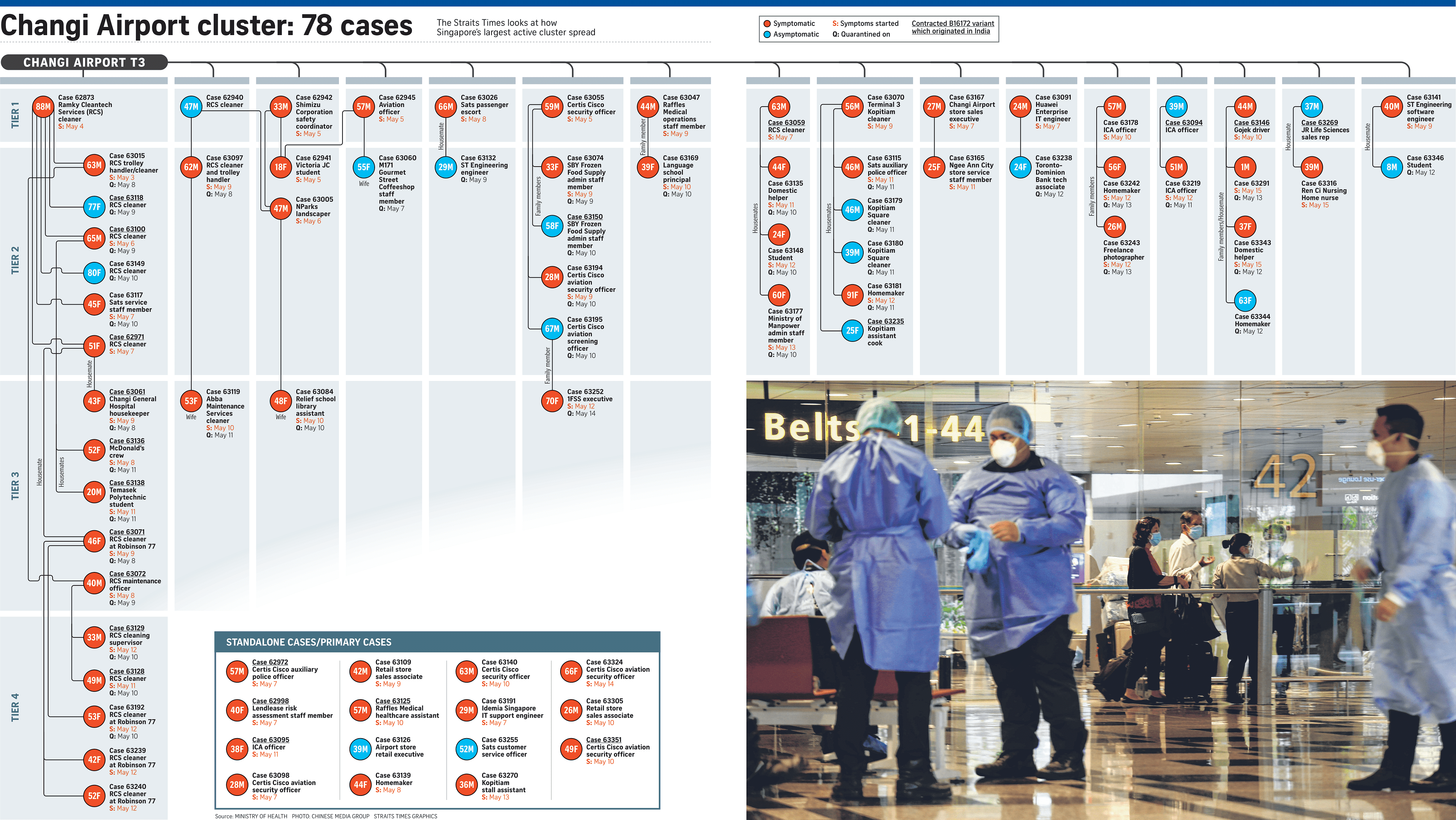SINGAPORE - In less than two weeks, the Changi Airport cluster has emerged as the country's largest community cluster to date - second only to the outbreak in the worker dormitories - with a total of 78 Covid-19 cases linked to it.
What is even more worrying is how the virus has hit a large number of elderly workers, as much as it has also infiltrated visitors to public places within the airport.
Professor Teo Yik Ying, dean of the National University of Singapore's Saw Swee Hock School of Public Health, said that the most striking thing about this cluster is how rapidly the virus has spread between the cases.
"We have seen not just two generations of spread - but up to three and even four generations that happened within a matter of less than two weeks."
Health Minister Ong Ye Kung said last Friday (May 14) that the workers who were infected with Covid-19 mainly received travellers from high-risk countries at a zone which includes a conveyor belt and an immigration area that passengers have to pass through.
Workers who were in charge of this area would then go on to have their meals at the Terminal 3 Basement 2 commercial area and food court, where they were likely to have passed on the virus to the community.
This high-risk zone, which Mr Ong likened to Ward 9D of the Tan Tock Seng Hospital cluster - the ground zero of recent infections - could be a weak link where imported cases with more virulent Covid-19 variants could seep into the community.
Prof Teo said the areas where people are more likely to come together, such as immigration checkpoints and baggage collection areas, are where the risk of transmission will be higher.
"The fact is that these areas are indoors and air-conditioned, thus meaning the air is cooler and less humid, creating an environment that likely permits the coronavirus to stay viable for longer, whether it is as droplets, aerosols, or on surfaces," he said.
With emerging variants like the B1617 strain being more transmissible than what was previously seen last year, it could mean that even transient exposure through close contact with someone contagious, or increased survivability of the coronavirus would be sufficient to infect, added Prof Teo.
This is even as infection prevention and control (IPC) protocols - such as the wearing of personal protective equipment and ensuring the frequent disinfecting of surfaces - continue to remain in place, suggesting that these measures may no longer be as adequate.
Associate Professor Kenneth Mak, director of medical services at the Ministry of Health, said last Friday that the PPE regime for front-line workers will be reviewed, starting with the hospitals, before this is extended to other sectors.
Hence, while it is important to investigate any lapses in the existing protocols, Prof Teo said that ramping up crowd segregation and IPC protocols should also be considered.
The index case to the airport cluster was an 88-year-old cleaner, who was employed by Ramky Cleantech Services and deployed at Changi Airport Terminal 3. He tested positive on May 5 despite being fully vaccinated.
A total of 16 employees from Ramky Cleantech Services have since tested positive for the virus, with some testing positive while deployed to Robinsons 77, the former SIA Building.
Most of the infected employees are cleaners, and about half the employees are above the age of 60. Not all of them were vaccinated.
The recent cases have shown that while vaccination does not completely prevent one from becoming infected, it can reduce the chances of infection and prevent the onset of serious disease.
As at last Friday, only 19 out of the 28 infected airport workers were fully vaccinated. None of them needed oxygen support.
Therefore, vaccinating front-line workers at all of Singapore's border checkpoints, as well as those in "outward facing professions" is important, as they will invariably come into contact with people coming from overseas, said Prof Teo.
In addition, it is important to think about who these workers are so that the net is cast wide enough to include auxiliary staff such as canteen operators, cleaners and even shuttle bus drivers of these workers, he added.
Certain sectors can also put in place strong recommendations to have their workforce vaccinated - just like the case for healthcare workers - as a supportive work environment could enable a higher vaccine uptake.
"For elderly workers who are working in front-line sectors, the companies can also strongly encourage them to take up the vaccination, and to redeploy those who preferred not to be vaccinated to job scopes that are lower in risk," he said.













